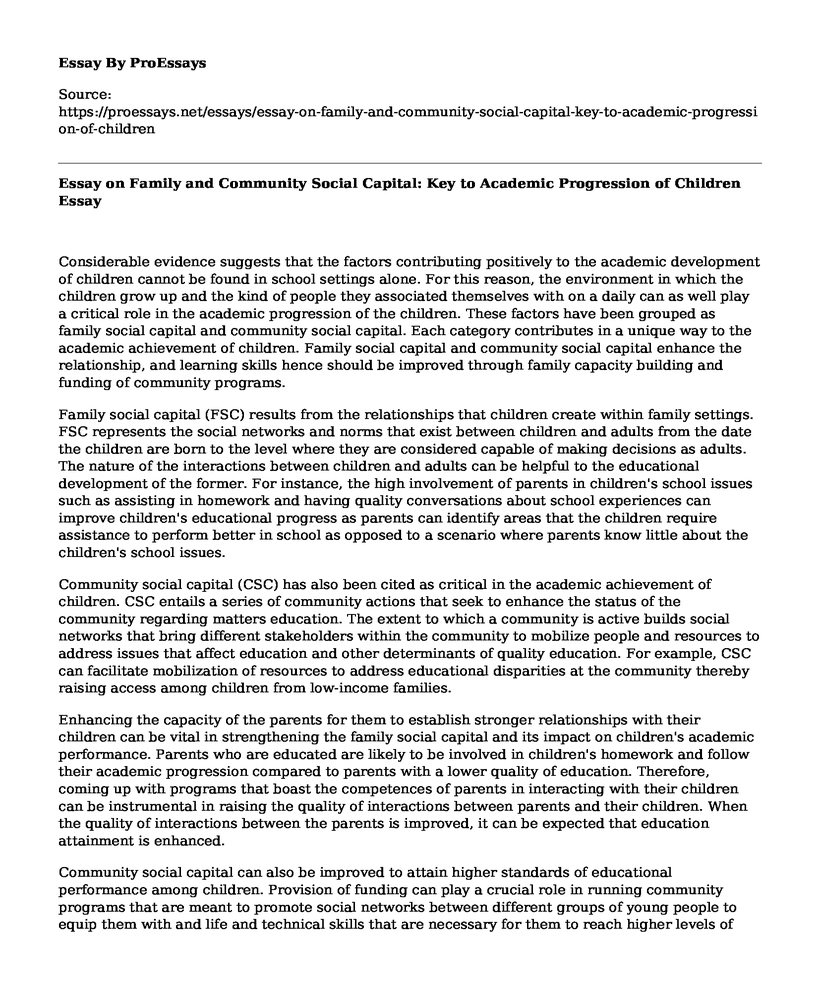Considerable evidence suggests that the factors contributing positively to the academic development of children cannot be found in school settings alone. For this reason, the environment in which the children grow up and the kind of people they associated themselves with on a daily can as well play a critical role in the academic progression of the children. These factors have been grouped as family social capital and community social capital. Each category contributes in a unique way to the academic achievement of children. Family social capital and community social capital enhance the relationship, and learning skills hence should be improved through family capacity building and funding of community programs.
Family social capital (FSC) results from the relationships that children create within family settings. FSC represents the social networks and norms that exist between children and adults from the date the children are born to the level where they are considered capable of making decisions as adults. The nature of the interactions between children and adults can be helpful to the educational development of the former. For instance, the high involvement of parents in children's school issues such as assisting in homework and having quality conversations about school experiences can improve children's educational progress as parents can identify areas that the children require assistance to perform better in school as opposed to a scenario where parents know little about the children's school issues.
Community social capital (CSC) has also been cited as critical in the academic achievement of children. CSC entails a series of community actions that seek to enhance the status of the community regarding matters education. The extent to which a community is active builds social networks that bring different stakeholders within the community to mobilize people and resources to address issues that affect education and other determinants of quality education. For example, CSC can facilitate mobilization of resources to address educational disparities at the community thereby raising access among children from low-income families.
Enhancing the capacity of the parents for them to establish stronger relationships with their children can be vital in strengthening the family social capital and its impact on children's academic performance. Parents who are educated are likely to be involved in children's homework and follow their academic progression compared to parents with a lower quality of education. Therefore, coming up with programs that boast the competences of parents in interacting with their children can be instrumental in raising the quality of interactions between parents and their children. When the quality of interactions between the parents is improved, it can be expected that education attainment is enhanced.
Community social capital can also be improved to attain higher standards of educational performance among children. Provision of funding can play a crucial role in running community programs that are meant to promote social networks between different groups of young people to equip them with and life and technical skills that are necessary for them to reach higher levels of academic achievement. Notably, designing programs that promote integration through social networks can break barriers between children in the communities thereby helping them learn different skills and knowledge through socialization within the community. A program that targets youths that are exposed to crime and drugs can create a platform for these youths to develop behaviors that are favorable to academic progression.
Conclusion
In conclusion, family social capital represents the social networks that children in a family setting. Parents and siblings can positively or negatively influence on academic attainment. Community social capital refers to the community factors that increase or decrease social interactions among children and youths within the community. Family factors can be enhanced by building capacity for parents while community social capital can be strengthened through funding community programs that promote social networks among children and the youth. While implementing the highlighted interventions, it is crucial to note academic achievement is a complex process. Therefore, the focus should be to other determinants of academic achievement as well.
References
Israel, G. D., Beaulieu, L. J., & Hartless, G. (2001). The influence of family and community social capital on educational achievement. Rural Sociology, 66(1), 43-68. doi:10.1111/j.1549-0831.2001.tb00054.x
Cite this page
Essay on Family and Community Social Capital: Key to Academic Progression of Children. (2023, Jan 04). Retrieved from https://proessays.net/essays/essay-on-family-and-community-social-capital-key-to-academic-progression-of-children
If you are the original author of this essay and no longer wish to have it published on the ProEssays website, please click below to request its removal:
- The American Health Care and the Importance of Psychology in Child Development
- Dress-Codes Applications in the US and the Negative PR Impact on Schools
- Paper Example on Motivation of Heritage Students in Foreign Language Classrooms
- Online Learning as a More Effective Tool in Distance Learning Essay Example
- Silent Reading: Exploring Its Effects on the Brain - Research Paper
- Essay Example on Cognitive Development: Piaget's Stages of Growth in Children
- Essay Example on Should Kids Play Contact Sports? Pros, Cons & Concerns Debated







